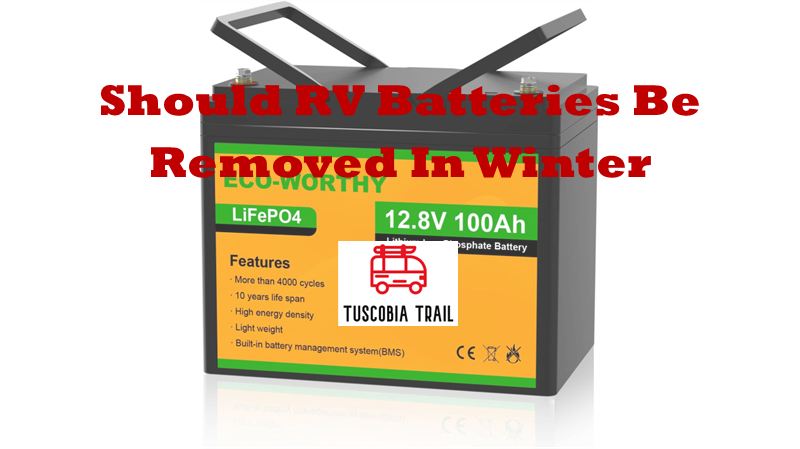When winter approaches, RV owners quite rightly often wonder about the best practices for battery maintenance. Should RV batteries be removed in winter?
During the motorhome off-season, if you are not planning on using your van much, removing your RV batteries for winter storage is generally recommended.
If you place your RV in winter storage, you can remove your batteries to protect them from potential damage and extend their lifespan.
Should RV Batteries Be Removed When In Winter Storage?
Removing your RV batteries during winter offers several benefits including freeze protection as temperatures drop.
Batteries are at risk of freezing, especially if they’re discharged, and a frozen battery can suffer permanent damage and need replacing.
Leaving your RV plugged in all winter isn’t recommended as it can lead to overcharging, which damages batteries and poses a fire risk too.
With the batteries removed, you can also easily perform regular checks and maintenance throughout the winter and ensure they are ready for the warmer spring months.
Proper RV Battery Storage Procedure
To ensure your batteries are ready for the next camping season, follow these steps when winterizing your RV:
- Remove the batteries from your RV.
- Check water levels in flooded lead-acid batteries and top up if necessary.
- Fully charge the batteries before storage.
- Store in a warm, dry location, ideally between 32°F and 80°F5.
- Use a battery maintainer to keep the charge level optimal.
- Perform monthly checks on charge levels and overall condition.
RV Battery Maintenance Tips
While traditional lead-acid batteries are still common, lithium-ion batteries are gaining popularity in the RV world as they have a longer lifespan.
Proper maintenance can significantly extend your RV battery’s lifespan whichever variety you have in your motorhome.
It is recommended to clean terminals regularly by using a mixture of baking soda and water to remove corrosion.
Maintain proper charge levels and keep batteries at or above 75% state-of-charge. Try not to let the charge drop below 50% and if you do plug in your RV battery for charging immediately.
Using smart chargers is a good idea as they prevent overcharging and maintain optimal charge levels, or use a battery maintainer that can automatically keep your battery at an optimal charge level without overcharging.
How Often To Check Charge Status of RV Battery During Winter Storage
To maintain your RV battery during winter storage, it is advisable to check the charge status every 30 days.
This regular monitoring helps prevent deep discharges, which can lead to irreversible damage, especially in lead-acid batteries.
If the charge drops below 75% of capacity, you should recharge the battery to ensure it remains healthy throughout the winter.
How To Tell If RV Battery Is Damaged
To determine if your RV battery has been damaged during winter storage, look for cracks, bulges or deformities in the battery case.
Check for excessive corrosion on the terminals and inspect for any leaks if you have a flooded lead-acid battery in your RV.
Perform a voltage test using a multimeter to check the battery’s voltage. A fully charged 12V battery should read around 12.6-12.8 volts. If the voltage is significantly lower, it may indicate damage or deep discharge.
Also test it by performing a load test to check the battery’s ability to hold a charge under load. If the voltage drops rapidly under load, this could indicate internal damage.
If it is losing voltage, attempt to charge the battery by plugging it in. If it doesn’t accept a charge or charges much faster than usual, this could be a sign of damage.
When in use, if the battery drains quickly or cannot power your RV’s systems as it should, then you may also have suffered winter storage damage.
FAQs
How often should I check my RV battery’s water levels?
For flooded lead-acid batteries, check water levels every 2-4 weeks during active use, and every 3-6 months during storage.
Can I leave my RV plugged in all winter?
It’s not recommended, as this can lead to overcharging and battery damage. If you must keep it plugged in, use a smart charger or battery maintainer.
How long do RV batteries typically last?
With proper care, lead-acid deep-cycle batteries can last 4-5 years, while lithium-ion batteries can last up to 10 years or more.
What’s the ideal storage temperature for RV batteries?
Store batteries in a location with temperatures between 32°F and 80°F.
How can I tell if my RV battery needs replacement?
Signs include difficulty holding a charge, decreased performance, and visible damage or corrosion. If your battery voltage drops below 10.5 volts, it may be time for a replacement.
